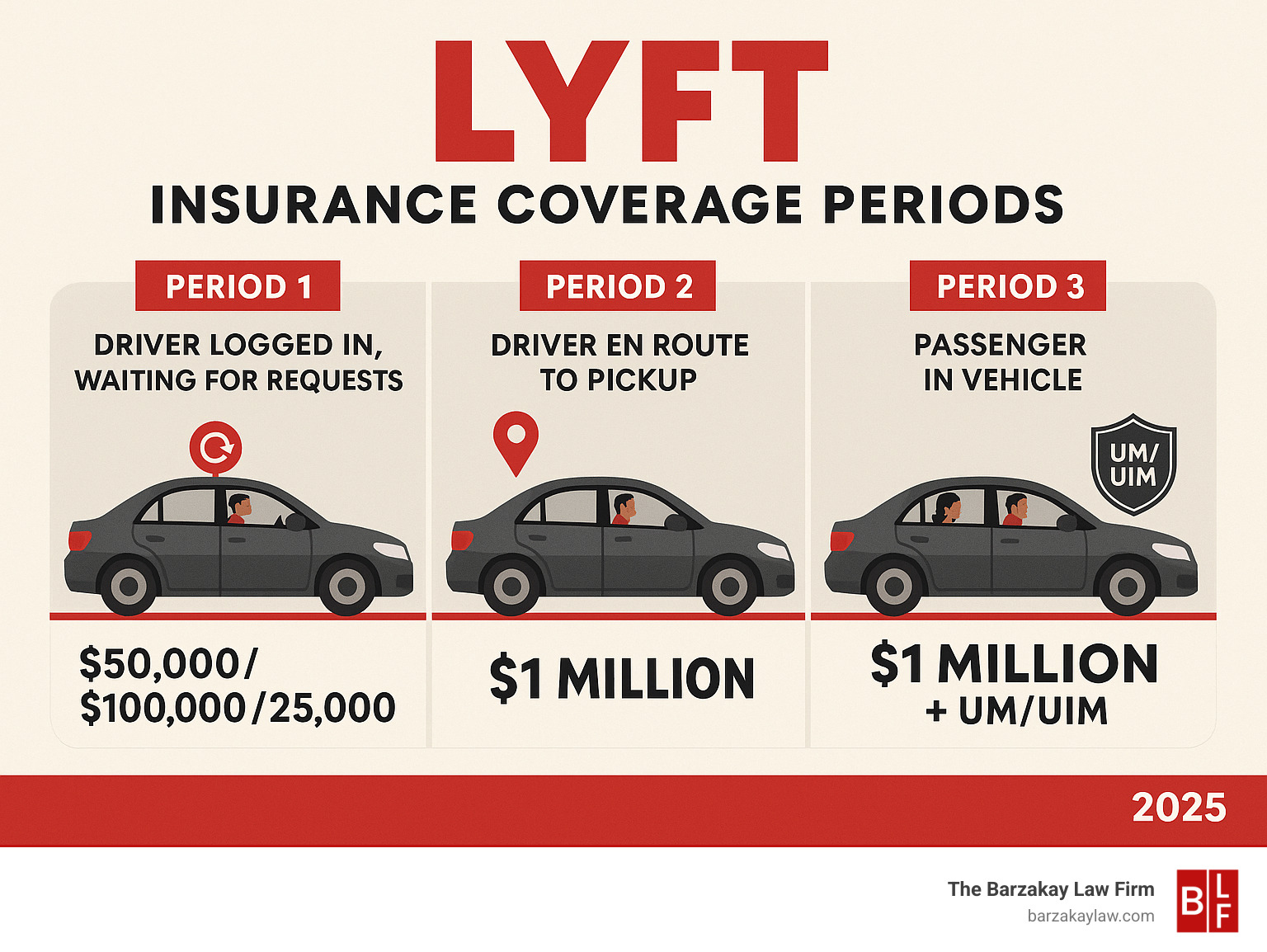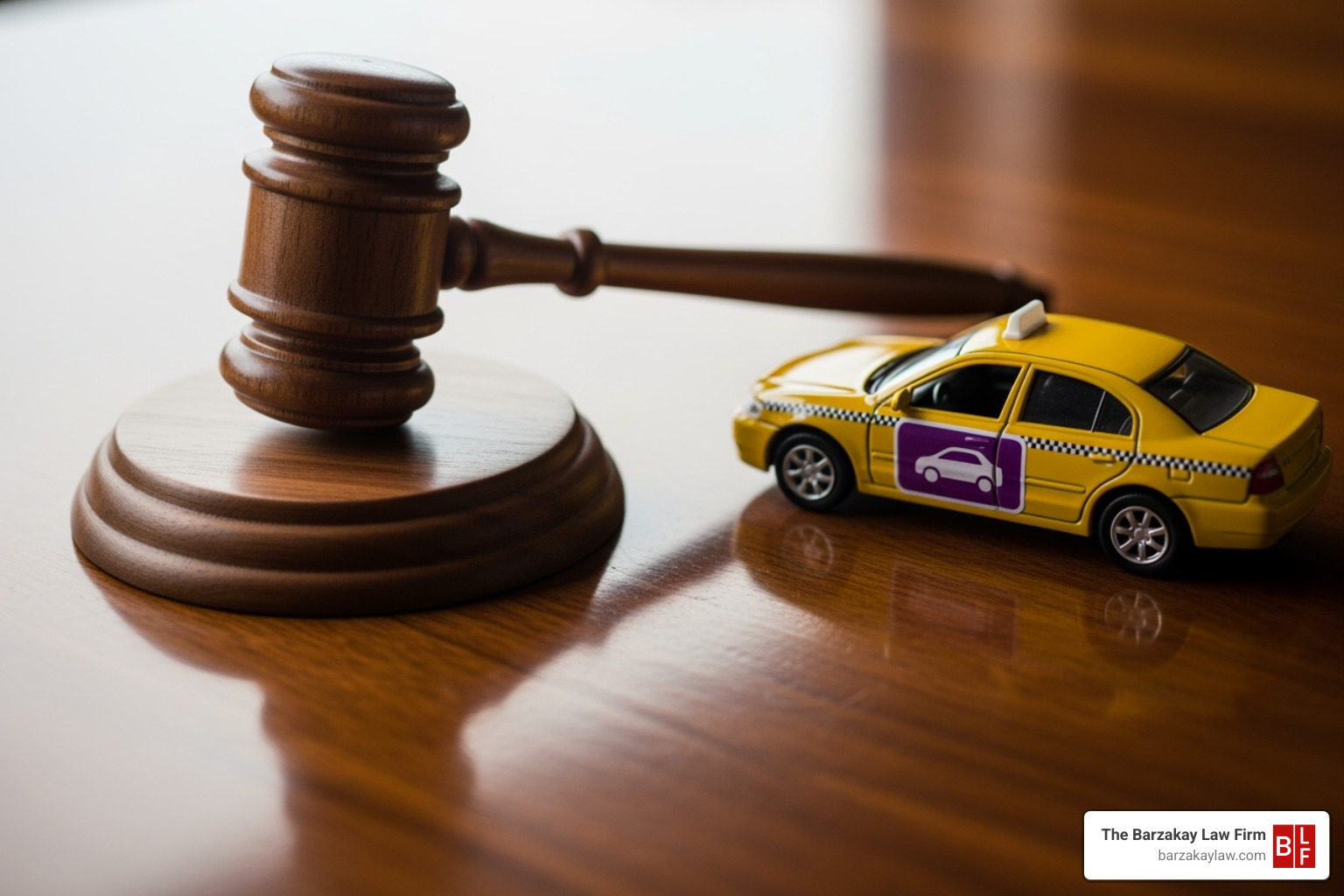When Lyft Accidents Turn Your Life Upside Down
Suing Lyft for car accident cases can be overwhelming when you’re facing injuries, medical bills, and complex insurance claims. The good news is that you have legal rights, and there are clear steps you can take to seek justice and compensation.
Can you sue Lyft after an accident? Yes, but the process depends on when the crash occurred and who was at fault. Lyft’s insurance coverage varies, from $50,000 when a driver is waiting for a ride request to $1 million when transporting a passenger. Multiple parties could be liable, including the driver, Lyft, or another motorist. In Florida, you have a limited time to act—the statute of limitations is just two years to file a lawsuit. For this reason, gathering evidence like photos, medical records, and witness statements is crucial to strengthen your case.
Accidents involving a Lyft vehicle are more complicated than typical car crashes due to multiple insurance policies and corporate legal teams trained to minimize payouts. Whether you were a passenger, another driver, or a pedestrian in Hollywood, Miami, or Boca Raton, understanding your rights is the first step. This guide explains what you need to know about taking legal action after a Lyft accident.
Learn more about suing lyft for car accident:
What to Do Immediately After a Lyft Accident in Florida
The moments after a Lyft accident are chaotic, but the steps you take can significantly impact your health and any future legal case. What you do in these first few minutes can make a huge difference.
Your safety is the top priority. Check yourself and others for injuries. Adrenaline can mask serious conditions like whiplash or internal injuries, so don’t assume you’re fine.
If it’s safe, move your vehicle out of traffic and call 911 immediately. A police report is critical evidence. Florida law requires reporting accidents)/documents/mcl/pdf/mcl-300-1949-VI-ACCIDENTS.pdf) that involve injuries or significant property damage.
While waiting for help, gather evidence if you can do so safely. Also, report the accident to Lyft through their app, but keep your statement brief and factual.
Document Everything
Collecting information at the scene will strengthen your case. Use your phone to document as much as possible.
- Get the driver’s name and insurance information.
- Collect contact details from any witnesses. Their testimony can be crucial.
- Take photos and videos of everything: vehicle positions, damage to all cars, road conditions, traffic signs, and skid marks. Also, photograph your injuries.
- If you were a passenger, take screenshots of your Lyft app ride details. This includes the driver’s info, the trip route, and the fare. This helps establish which insurance period was active.
Seek Prompt Medical Care
Do not skip seeing a doctor, even if you feel fine. Many serious injuries, such as traumatic brain injuries or internal bleeding, have delayed symptoms.
Seeking prompt medical attention accomplishes two things: it protects your health by catching issues early, and it creates medical records that link your injuries to the accident. This documentation is essential for proving your case.
Insurance companies often argue that injuries were pre-existing. A timely medical evaluation makes it much harder for them to dispute the cause of your injuries.
Follow your doctor’s treatment plan completely. Attend all follow-up appointments and therapy sessions. This demonstrates the severity of your injuries and your commitment to recovery. These actions are vital whether you’re in Hollywood, Miami, or Boca Raton.
Understanding Liability: Who Is Responsible for the Crash?
Determining who is responsible is a key challenge when suing Lyft for car accident damages. Unlike typical car crashes, rideshare accidents can involve multiple liable parties, making the situation complex.
Often, the accident is caused by driver negligence. This includes common mistakes like distracted driving while using the Lyft app, speeding, driving under the influence (DUI), or making reckless lane changes on busy South Florida streets.
However, Lyft classifies its drivers as independent contractors, not employees. This is a legal distinction Lyft uses to avoid automatic responsibility for a driver’s actions under the principle of vicarious liability. This means you can’t always hold Lyft accountable just because their driver was at fault.
Proving Driver Negligence
To build a case against a Lyft driver, we must prove four elements of negligence:
- Duty of Care: The driver had a legal duty to operate their vehicle safely.
- Breach of Duty: The driver failed to meet this duty through careless actions.
- Causation: The driver’s breach of duty directly caused your accident and injuries.
- Damages: You suffered measurable financial and personal losses.
We use evidence like police reports, witness testimony, and traffic camera footage to establish these elements.
When Can Lyft Be Held Directly Liable?
While the independent contractor status is a defense, Lyft can be held directly liable for its own negligence in certain situations.
- Negligent Hiring: Lyft may be liable if it hired a driver with a known dangerous driving record or criminal history that a proper background check should have flagged.
- Negligent Retention: The company can be held responsible if it kept a driver active despite receiving multiple complaints about reckless driving or other safety issues. This is a failure to act on complaints.
- Negligent Supervision: Lyft has access to data on its drivers’ behavior (speeding, hard braking). If the company ignores these warning signs and fails to monitor its drivers properly, it may be considered negligent.
Pursuing a direct claim against Lyft requires a deep investigation into its internal records and practices. This can be challenging but may lead to more substantial compensation from the corporation itself rather than just the driver’s insurance.
Navigating Lyft’s Insurance Maze
Understanding Lyft’s insurance is key to any accident claim. When suing Lyft for car accident damages, the available coverage depends entirely on what the driver was doing at the time of the crash. The insurance operates on a three-tier system, with different levels of protection activating in different scenarios.
Was the driver logged into the app and waiting, on the way to pick you up, or was a passenger already in the car? The answer determines which policy applies and the amount of compensation available. If the driver’s app was off, only their personal auto insurance applies.
| Lyft Insurance Coverage Periods | Driver Status | Coverage Limits |
|---|---|---|
| Period 1 | Driver logged in, waiting for a ride request | $50,000 bodily injury per person / $100,000 bodily injury per accident / $25,000 property damage |
| Period 2 | Driver accepted a ride, en route to pick up | $1,000,000 third-party liability |
| Period 3 | Driver transporting a passenger | $1,000,000 third-party liability |
For more details, you can review Lyft’s insurance policy details, but here is a breakdown of what matters for your case.
Period 1: Driver is Logged In and Waiting for a Request
If a driver has the Lyft app on but is waiting for a ride request, a limited contingent liability policy applies. This coverage is secondary and only kicks in if the driver’s personal auto insurance denies the claim (often because they were engaged in commercial activity).
During Period 1, Lyft’s coverage is capped at $50,000 per person for bodily injury, $100,000 total per accident, and $25,000 for property damage. These amounts are often insufficient for serious injuries.
Periods 2 & 3: Driver is En Route or Transporting a Passenger
Once a driver accepts a ride request (Period 2) until the passenger is dropped off (Period 3), Lyft’s $1 million third-party liability policy is active. This is the primary insurance and provides much more robust coverage.
This $1 million policy covers injuries to:
- Passengers in the Lyft
- Pedestrians or cyclists hit by the Lyft
- Occupants of other vehicles involved in the crash
During these periods, Lyft also provides uninsured and underinsured motorist (UM/UIM) coverage. If an at-fault driver who hits the Lyft has little or no insurance, this policy can cover your damages. This is a critical protection for passengers, pedestrians, and other drivers. Proving which period was active at the time of the crash is vital to securing the maximum available compensation.
The Process of Suing Lyft for a Car Accident
Suing Lyft for car accident damages is more complex than a standard claim. You’re up against a major corporation with legal teams dedicated to minimizing payouts. Understanding the process is the first step to protecting your rights.
Insurance companies, including Lyft’s, often make quick, low settlement offers, hoping you’ll accept before understanding the true value of your claim. This is a common tactic in South Florida cities like Hollywood and Miami, where rideshare accidents are frequent.
Key Steps in Suing Lyft for a Car Accident
The legal process generally follows these stages. Hiring an attorney early is recommended to guide you through each step.
- Investigation: We conduct a thorough investigation beyond the police report, gathering medical records, witness statements, and evidence to determine which insurance policy applies.
- Demand Letter: We send a formal demand letter to the at-fault parties’ insurance companies. This letter outlines the facts, details your injuries, and demands fair compensation.
- Filing a Lawsuit: If the insurance company refuses to offer a fair settlement, we file a lawsuit in Florida court, moving the case into the formal legal system.
- Findy: Both sides exchange information through written questions and depositions (sworn testimony). This is where we can uncover crucial evidence about Lyft’s practices or the driver’s history.
- Negotiation and Trial: Settlement negotiations can occur at any point. Most cases are resolved this way. However, if a fair agreement isn’t reached, we are prepared to take your case to trial.
Challenges When Suing Lyft for a Car Accident
Be prepared for aggressive defense tactics from Lyft.
- Independent Contractor Defense: Lyft will argue it is not responsible for its drivers’ actions because they are not employees. We counter this by focusing on the driver’s insurance or proving Lyft’s own negligence.
- Mandatory Arbitration: Lyft’s terms of service include a mandatory arbitration clause, which may move your case out of court. We can steer this process on your behalf.
- Lowball Offers: Insurers will try to settle your claim for less than it’s worth. We handle all communications to protect you from these tactics.
- Proving Company Negligence: Showing Lyft was negligent in its hiring or supervision requires a deep investigation to compel the company to release internal records.
While these challenges are significant, they can be overcome with a knowledgeable legal approach.
What Compensation Can You Recover?
After a Lyft accident, you are entitled to compensation for all the ways the crash has affected your life. When suing Lyft for car accident damages, the goal is to recover compensation for both your financial and personal losses to help you get back on your feet.
Settlements in South Florida can range from thousands to over a million dollars, depending on the severity of the injuries and the specifics of the case. We work to calculate the true cost of your injuries, including past and future losses.
Economic Damages (Tangible Losses)
These are the specific, calculable financial costs resulting from the accident.
- Medical expenses: Includes all costs from the ambulance ride and ER visit to future surgeries, medication, and rehabilitation.
- Lost wages: Compensation for the income you lost while unable to work.
- Diminished earning capacity: If your injuries prevent you from returning to your previous job or earning the same income, you can be compensated for this future loss.
- Property damage: Covers the cost to repair or replace your vehicle and any personal items damaged in the crash.
Non-Economic Damages (Intangible Losses)
These damages compensate you for the non-financial, personal impact of the accident. They are very real and deserve to be recognized.
- Pain and suffering: Acknowledges the physical pain, discomfort, and emotional distress you have endured.
- Emotional distress: Covers psychological impacts like anxiety, depression, or post-traumatic stress disorder (PTSD) resulting from the crash.
- Scarring and disfigurement: Compensation for permanent physical changes and their emotional impact.
- Loss of enjoyment of life: Addresses the loss of ability to participate in hobbies and activities you once enjoyed.
- Loss of consortium: In some cases, a spouse may claim damages for the negative impact the injuries have had on the marital relationship, as defined by loss of consortium.
In rare cases involving extreme recklessness, punitive damages may be awarded to punish the defendant and deter similar conduct in the future.
Frequently Asked Questions about Lyft Accident Lawsuits
We understand you have many questions about suing Lyft for car accident injuries. Here are answers to some of the most common concerns we hear from clients in Hollywood, Miami, and Boca Raton.
How long do I have to file a lawsuit after a Lyft accident in Florida?
In Florida, the statute of limitations gives you just two years from the date of the accident to file a personal injury lawsuit, according to Florida Statute 95.11. This is a strict deadline.
If you miss it, you lose your right to seek compensation, no matter how strong your case is. Acting quickly is also vital for preserving evidence like surveillance footage and witness memories, which can be lost over time.
Can I sue if I was a passenger in the Lyft?
Yes. As a passenger, you are almost never at fault for an accident, which simplifies your claim. If the crash occurred while you were on a trip or the driver was en route to pick you up, you are covered by Lyft’s $1 million liability policy.
We can pursue compensation from the at-fault driver’s insurance, Lyft’s policy, and potentially sue Lyft directly if there is evidence of negligent hiring or supervision. Being a passenger often provides access to more insurance coverage and stronger legal protections.
What if another driver, not the Lyft driver, was at fault?
This is a common situation. Your primary claim would be a third-party claim against the at-fault driver’s insurance company. However, many Florida drivers are uninsured or carry minimal coverage.
This is where Lyft’s insurance acts as a crucial safety net. Lyft’s uninsured/underinsured motorist (UM/UIM) coverage is designed to cover your damages if the at-fault driver’s insurance is insufficient. This protection is available to passengers even when the Lyft driver did nothing wrong. We can help steer these overlapping policies to maximize your recovery.
Get Guidance on Your South Florida Rideshare Claim
After a Lyft accident in Hollywood, Miami, Boca Raton, Sunrise, Orlando, or Fort Lauderdale, you shouldn’t have to face a complex legal battle alone. These cases involve unique challenges, from proving liability against an independent contractor to navigating Lyft’s tiered insurance system.
Insurance adjusters are trained to protect their company’s profits, not to ensure you receive fair compensation. They know the system and may try to convince you to accept less than you deserve.
You deserve to focus on healing, not fighting corporations.
At The Barzakay Law Firm, we understand the complexities of suing Lyft for car accident injuries. We know how to counter the tactics used by large corporations and their insurance providers.
Our firm works on a contingency fee basis, meaning you pay no legal fees unless we win your case. Our success is tied to your success.
Understanding your rights is the first step. Whether you were a passenger, another driver, or a pedestrian, you have legal options. Acting quickly is key to preserving evidence and meeting Florida’s strict statute of limitations.
Don’t let the complexity of a rideshare claim prevent you from seeking the compensation you need for your medical bills, lost wages, and pain and suffering. If you were injured in a Lyft accident, contact us for a free, no-obligation consultation. Let us handle the legal work while you focus on your recovery.




